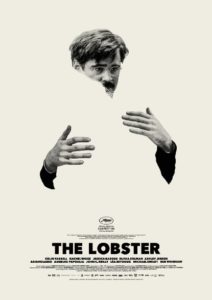The Lobster | Director: Yorgos Lanthimos | Rating: 10.5/11
 Our society is fixated on couples: so fixated that is not uncommon for those who are not in a couple to be treated like outsiders. To remedy their sorry state, friends, family, and general societal pressures will force them into coupledom (even if they don’t wish to be in one, especially with the person they are being pushed towards). Director Yorgos Lanthimos mocks this mentality in his razor-sharp satire, The Lobster.
Our society is fixated on couples: so fixated that is not uncommon for those who are not in a couple to be treated like outsiders. To remedy their sorry state, friends, family, and general societal pressures will force them into coupledom (even if they don’t wish to be in one, especially with the person they are being pushed towards). Director Yorgos Lanthimos mocks this mentality in his razor-sharp satire, The Lobster.
The Lobster – Lanthimos’ first American film – takes place in a dystopian society where single people have 45 days to find true love or else be turned into the animal of their choice. The story begins with David (Colin Farrell) who, after being dumped by his wife, is forced into “the hotel” where he attempts to find a new partner. After several romantic mishaps, he escapes into the woods and joins The Loners: a group ran by a no-nonsense leader (Lea Seydoux). The Loners have one mantra: there is no romance between any of the members, and any romance is strictly forbidden. But when David starts to fall for one of the loners (Rachel Weisz), his situation becomes far more complicated.
The world of The Lobster is a fascinating and, at times, hilarious one. The hotel forces all of its guests to wear the same uniforms and attend the same events. Everything looks like everything else and none of the hotel staff seems to realize the irony of trying to love in a completely controlled situation. When first meeting David, one of the owners casually remarks, “that it would be absurd for a camel and hippo to date” and that it’s smart of him to want to become a lobster since so many people pick dogs (hence the influx of dogs in the world). All of the characters (with the exception of David) are named after their disabilities which become their defining feature, such as “Nose Bleed Woman,” “Limp Man” and “Lisping Man.” It becomes increasingly apparent that guests find partners based on their shortcomings such as both having nose bleeds (even when one of the partners does not). The pairings are a clever remark on our own society’s coupling, as couples tend to base their attraction off of similar interests such as long walks on the beach and a love for Italian food. Even more on point is the hotel’s way of handling a couple’s fight: by using an unfortunate method many couples have used to solve their problems in the real world.
Even though The Loners seem more healthy than the control of the hotel, they’re still not really happy. Due to the strict no-romance rules, they are as suffocating as the hotel is, although they do get to have dance parties where they put in headphones and dance alone. Lanthimos’ inclusion of The Loners is a clever take on those who rebel against society’s fixation on coupledom and those who flat-out insist they do not need love and won’t accept it even if it is right in front of them.
Filmed along the gray coastline of Ireland’s County Kerry, the serene beauty is an interesting contrast to the film. The deep woods and sprawling sea are stunning against the strict rules of the hotel and The Loners. Lanthimos also opts for existing pop and classic melodies as opposed to an original soundtrack. The sharp uptakes in the music match the drama of the film perfectly.
The Lobster is the type of film that stays with you long after it is over. Our society may never change its obsession with coupling, but The Lobster reminds us – even if that’s true – it isn’t a standard that one should be forced into. There’s no perfect formula when it comes to love and, since there are no rules, it’s simply best to follow our own.
